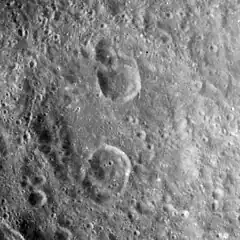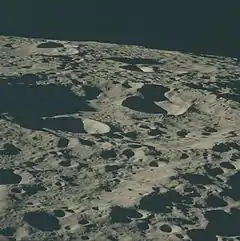Kondratyuk (crater)
Kondratyuk is a worn crater on the Moon's far side. It is located to the west-northwest of the large walled plain Fermi, and to the northeast of the crater Hilbert. To the north-northwest is Meitner, and to the northeast lies Langemak.
 Apollo 15 mapping camera image of Kondratyuk. North is in upper left. Kondratyuk A is at top, Kondratyuk Q at bottom. | |
| Coordinates | 14.9°S 115.5°E |
|---|---|
| Diameter | 98 km |
| Depth | Unknown |
| Colongitude | 245° at sunrise |
| Eponym | Yuri V. Kondratyuk |
This is an eroded crater formation with a rim that has been partly damaged by subsequent impacts. The small, sharp-rimmed satellite crater Kondratyuk A lies on the interior floor, along the northeast inner wall. In the southwest part of the floor is Kondratyuk Q.
Prior to formal naming by the IAU in 1970,[1] Kondratyuk was called Crater 278.[2] It is named in honor of Yuri Kondratyuk, a Ukrainian and Soviet engineer and mathematician, who fought and died in World War II, as a volunteer of the Red Army.
Satellite craters
By convention these features are identified on lunar maps by placing the letter on the side of the crater midpoint that is closest to Kondratyuk. In this case both satellite craters are within Kondratyuk itself.
| Kondratyuk | Latitude | Longitude | Diameter |
|---|---|---|---|
| A | 14.2° S | 115.5° E | 25 km |
| Q | 15.7° S | 114.7° E | 28 km |
References
- Kondratyuk, Gazetteer of Planetary Nomenclature, International Astronomical Union (IAU) Working Group for Planetary System Nomenclature (WGPSN)
- Lunar Farside Chart (LFC-1A), 2nd Edition October 1967
- Andersson, L. E.; Whitaker, E. A. (1982). NASA Catalogue of Lunar Nomenclature. NASA RP-1097.
- Blue, Jennifer (July 25, 2007). "Gazetteer of Planetary Nomenclature". USGS. Retrieved 2007-08-05.
- Bussey, B.; Spudis, P. (2004). The Clementine Atlas of the Moon. New York: Cambridge University Press. ISBN 978-0-521-81528-4.
- Cocks, Elijah E.; Cocks, Josiah C. (1995). Who's Who on the Moon: A Biographical Dictionary of Lunar Nomenclature. Tudor Publishers. ISBN 978-0-936389-27-1.
- McDowell, Jonathan (July 15, 2007). "Lunar Nomenclature". Jonathan's Space Report. Retrieved 2007-10-24.
- Menzel, D. H.; Minnaert, M.; Levin, B.; Dollfus, A.; Bell, B. (1971). "Report on Lunar Nomenclature by the Working Group of Commission 17 of the IAU". Space Science Reviews. 12 (2): 136–186. Bibcode:1971SSRv...12..136M. doi:10.1007/BF00171763. S2CID 122125855.
- Moore, Patrick (2001). On the Moon. Sterling Publishing Co. ISBN 978-0-304-35469-6.
- Price, Fred W. (1988). The Moon Observer's Handbook. Cambridge University Press. ISBN 978-0-521-33500-3.
- Rükl, Antonín (1990). Atlas of the Moon. Kalmbach Books. ISBN 978-0-913135-17-4.
- Webb, Rev. T. W. (1962). Celestial Objects for Common Telescopes (6th revised ed.). Dover. ISBN 978-0-486-20917-3.
- Whitaker, Ewen A. (1999). Mapping and Naming the Moon. Cambridge University Press. ISBN 978-0-521-62248-6.
- Wlasuk, Peter T. (2000). Observing the Moon. Springer. ISBN 978-1-85233-193-1.
